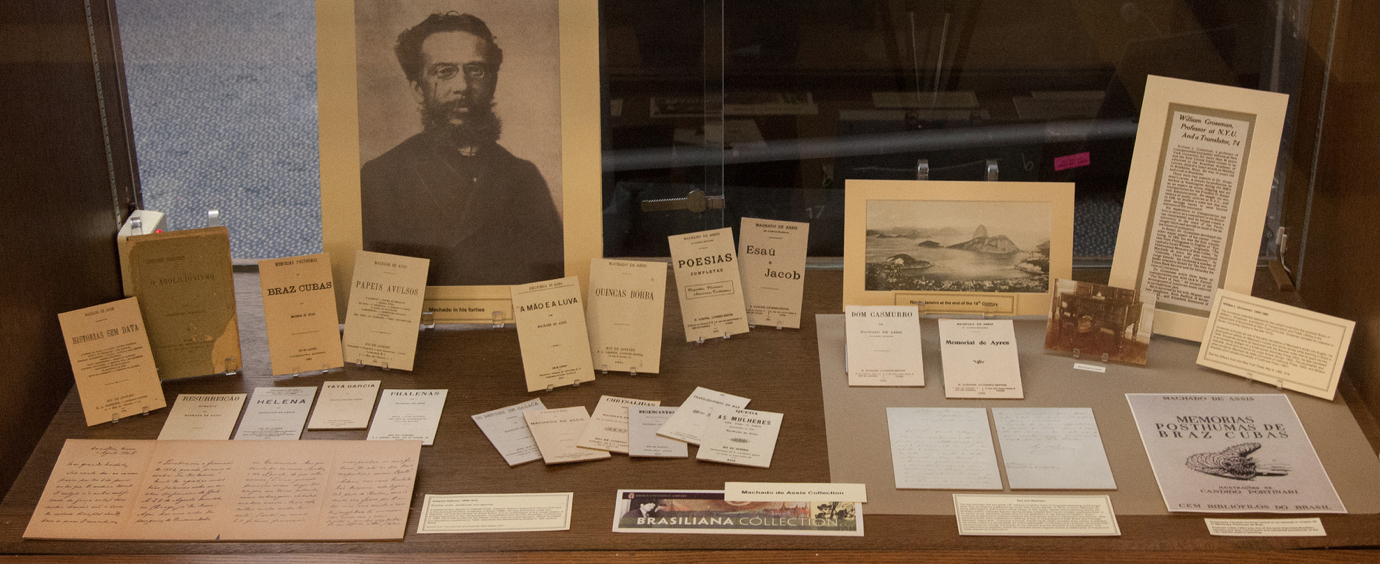The collection
In the late Nineteen Seventies, William L. Grossman (1906-1980), a professor of Transportation and Public Utilities in the Department of Economics at New York University donated to Brown University Library his private collection of early editions and critical works on Machado de Assis. The collection consists of 144 items now housed in the Rockefeller and John Hay libraries.

William L. Grossman was not a professor of literature, but it is no coincidence that he was captivated with Machado’s prose when residing in Brazil in 1948. While Machado remained largely unknown to the rest of the world in the late 1940s and even to this day, in Brazil his intellectual career was the object of great reverence and admiration by his contemporaries. Susan Sontag in her article “Afterlives: The Case of Machado de Assis” (New Yorker, 7 May 1990. 102-8), introduces a reissue of William L. Grossman’s 1952 translation of Epitaph of a Small Winner and presents Machado as a 19th century author who challenged traditional forms of narration. Sontag was “astonished that a writer of such greatness does not yet occupy the place he deserves” in world literature.
Grossman is known as one of the early translators of Machado’s works into English. He became so fascinated with the Brazilian writer that he spent his free time translating Epitaph for a small winner (Noonday Press,1952). He later translated Gabriela, clove and cinnamon by Jorge Amado (Knopf, 1962), The psychiatrist: and other stories by Machado de Assis (University of California Press, 1963), and Modern Brazilian short stories (University of California Press, 1967).
Click here to see a list of the materials donated by Prof. William L. Grossman. Click here for materials donated by Ruth Grossman Hadlock and Richard Hadlock.
Machado de Assis
To both Brazilian and international critics, Machado de Assis is a name that stands alone in 19th century Latin American fiction. Born on the 21st of June 1839 in Rio de Janeiro to a father of African ancestry and a white Portuguese mother, Machado de Assis, as an autodidact, rose above humble beginnings and a meager education to achieve the highest status of his country’s literary establishment. During his prolific career, Machado explored nearly every genre–poetry, theater, journalism, literary criticism, and translation–but it was as a novelist and a short story writer that Machado forged a narrative voice that would forever impact the literary topography of his nation. At a time when European models dominated, Machado rejected pure imitation and explored new ways to represent Brazilian society. In 1908, at the age of 69, Machado de Assis died in his native city, leaving behind a legacy of short stories and novels, which mordantly criticized Brazil’s insensitive upper middle class and elites with the use of subtle irony and well-crafted ambiguity. The masterful manner in which Machado created his memorable characters not only allows his readers, then and now, to better comprehend the realities of Brazilian society, but above all, the complexities of the human condition. This unprecedented contribution not only placed Brazilian literature on the literary map, but also paved the way for the “new novel” in 20th century Portuguese and Spanish America.
Click here to read more on Machado de Assis.

